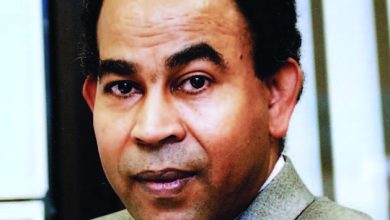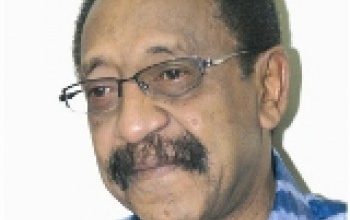Three Acts in Sudan’s Animal Farm of War

Mutasim Aqraa
Third Throw of the Dice:
From the start, the Janjaweed alliance’s strategy was to portray the Sudanese war as a conflict between an Islamist army and another side that enjoys the support of civilian/democratic forces, aligned on the necessity of civilian rule. The clear aim of this strategy was to isolate the Sudanese army domestically and internationally, allowing the Janjaweed alliance to realize its ambitions.
As time passed, the impact of this propaganda push began to fade. It became increasingly difficult to convince the Sudanese public of this simplification, especially as the Janjaweed rampaged through villages and areas with no military presence, violating the lives, property, and bodies of citizens. This appeared more as a war against the Sudanese people than a conflict between Islamists and non-Islamists. The Janjaweed’s barbarism displaced millions into exile and suffering within Sudan and beyond.
The false narrative further unraveled as the Janjaweed began destroying Sudan’s heritage, looting museums, burning libraries, and obliterating institutions of learning and public utilities. It became clear that the Janjaweed were not only targeting ordinary citizens but also the civilian infrastructure of the state. They sought to erase Sudan’s identity, history, and culture, selling some of the country’s most important and ancient artifacts in cheap global markets. All these signs indicated that this was not an absurd war between two misguided factions, but an attack on the Sudanese people, their state, culture, and historical identity.
The undeniable fact that civilians do not flee areas controlled by the army but escape en masse from any region approached by the Janjaweed poured cold water on the deceptive narrative that there was no difference between the army and the Janjaweed. This fact became apparent to all but the dogmatic ideologues—people whose stances are rooted in preconceived political beliefs and scriptures they once came across. These ideologues are unwilling to let material reality rob them of the warm certainty provided by their interpretation of the texts. They fail to recognize that dialectics are open to interpretation and only come to life through the words of men and women, as Farouk once said.
These ideologues also ignore that their claim of no difference between the two sides contradicts the collective consensus of the Sudanese people, who express their opinion by fleeing in terror from the Janjaweed and seeking refuge in army-controlled areas.
Sadly, the position of these ideologues suggests that the Sudanese people are nothing more than a herd of cattle, unaware of their own interests and ignorant of the so-called wisdom that there is no difference between the Janjaweed and the army. This perceived “ignorance” leads them to make the mistake of fleeing their villages at the arrival of the Janjaweed and seeking shelter in army-controlled areas.
Internationally, the influence of the above narrative also weakened as Western media and human rights organizations began reporting on the foreign arming and financing of the Janjaweed and the war crimes they commit, including genocide and widespread sexual violence. The U.S. administration has repeatedly condemned the Janjaweed, with key American decision-makers, including the State Department, Congress, and pro-state media outlets, echoing these denunciations.
As the opium of the deceptive narrative fades, the isolation of the Sudanese army from its people diminishes, both domestically and internationally. This forced the Janjaweed alliance to make its final move.
The final roll of the dice from the Janjaweed alliance is a desperate attempt, appearing as an inflated justification. The move involves warning the world that Sudan is at risk of becoming a haven for terrorist groups like Boko Haram and Al-Shabaab, leading to the creation of a terrorism belt stretching from the African Sahel in the west to the Somali coast in the east.
This terror belt, infested with evil Islamists, would harm the interests of civilized nations, disrupt global trade, threaten moderate countries in the region, and destabilize peaceful populations.
It is clear that the aim of this updated narrative is to pave the way for hostile nations to target Sudan under the guise of combating cross-border Islamic terrorism. The Janjaweed alliance hopes this narrative will provide theoretical justification for an anti-Sudan coalition, made up of neighboring countries, global sponsors, and regional “sugar daddies.”
Of course, regional and global powers, along with Sudan’s neighbors, do not need such a simplistic geopolitical security briefing. Therefore, the purpose of this narrative update is not to convince any state, all of which know far more than the mediocre minds of the Janjaweed alliance, but rather to provide a political-media cover for oppressing the Sudanese people with a heavy hand.
One of the strangest aspects of this new narrative is its failure to consider how it resonates with a Sudanese citizen in Wad al-Nura, Geneina, or El Fasher, or a citizen in the exiles of poverty and loss. This citizen, who suffers looting, rape, and murder at the hands of the Janjaweed right now, in real terms, why should they tremble at the thought of potential violence from Islamist groups that hasn’t occurred yet and remains a dream of a Janjaweed alliance hoping to find comfort in the arms of a foreign colonial power justified by their shared war against Islamic terrorism?
Why should the threat of potential Islamic terrorism, which hasn’t happened yet, take precedence over the immediate suffering of this citizen at the hands of the Janjaweed, as documented by global human rights organizations and international media?
Second Throw of the Dice:
Realizing their inability to secure a decisive military victory, the Janjaweed alliance also saw that their political horizon was completely blocked. Even if they were to achieve a military victory and raze all of Sudan’s cities to the ground, they wouldn’t be able to rule for even a week, even if Sudan was hit with a nuclear bomb and the army surrendered to the Janjaweed in a Japanese-style defeat.
The Janjaweed alliance understood that the blocked political horizon meant any military victory would be a Pyrrhic one, carrying its political defeat in the belly of its superior imported and advanced weapons. At that point, the alliance tried blackmailing with the threat of producing a Libyan model of two states, one of which would be a Janjaweed state in Darfur.
However, the strategic thinkers missed the fact that the Janjaweed do not represent Darfur or Kordofan. They also overlooked the rejection of the tribes of Darfur, which had been targeted by Janjaweed militias and subjected to repeated massacres in their lands since the days they served as guards for the Bashir regime, and continued during the war in places like Dar Masalit.
The hatred of the African tribes for the Janjaweed was not enough to block the Janjaweed’s threat to divide Darfur. Here, the historical role played by Jibril Ibrahim and Minni Arko Minnawi came into play, as they sided with the Sudanese state and fought alongside the Sudanese army to repel the Janjaweed invasion.
This shift can partly be explained by the fact that the conflict of Jibril and Minnawi’s movements with the Sudanese governments was over power and how to manage the Sudanese state. This fundamentally differs from the Janjaweed alliance’s goal of destroying the state rather than redistributing resources among its groups.
Regardless of whether one agrees or disagrees with their assessments, there is no doubt that the stance of Dr. Jibril and Mr. Minnawi is historic by all measures and will be recorded as one of the key factors shaping the future of the Sudanese state and the reality that will emerge once the war ends, however it does.
First Throw of the Dice:
At the start of the Sudanese war, the Janjaweed alliance sought to create a media-political image suggesting that the internal polarization was between Islamists (terrorists) supporting the army, on one hand, and a civilian, democratic, secular, modern camp, on the other. This camp presented itself as neutral and peaceful but covertly allied with the Janjaweed to overthrow the army of Islamist dark forces and dictator military bootlickers.
This narrative enjoyed significant success domestically for some time, but it eventually collapsed with the spread of the Janjaweed’s horrific violence.
The Janjaweed’s violence alone wasn’t enough to expose the false narrative. Secular, modernist figures played a crucial historical role by rejecting such simplifications, declaring that the sovereignty of the state and standing with the people against Janjaweed oppression were non-negotiable. They argued that betrayal and the rallying of criminal militias were not suitable alternatives for solving Sudan’s problems or putting an end to Islamist dominance, since any civilian-democratic rule imposed by invading forces was merely an impossible contradiction, one that only occurs in fantastical novels or in the mind of a child with a mouthful of food.
Some of the key figures opposing this capitulation, including secularists and Muslim intellectuals, are the globally renowned novelist Baraka Sakin, the linguistics scholar Ashari Ahmed Mahmoud, and the steadfast Sudanese Nubian Sheikh Mohamed Jalal Hashim, among others.
The first and second throws of the dice both failed, resulting in greater hatred and contempt for the deceit. I do not know what will become of the third throw.
Final Scene:
As I am an optimistic person and dislike gloom, I must conclude with a light and pleasant literary ending. In George Orwell’s Animal Farm, the animals rebelled and led a revolution against Mr. Jones, the abusive and drunken owner who subjected them to torment and oppression.
After overthrowing Mr. Jones, a new ruling group of animals emerged, led by the pigs Napoleon and Major. Rather than remaining loyal to the values and demands of the revolution, the new ruling group became a new tyrant, no less greedy and selfish than the ousted Mr. Jones.
The new ruling group monopolized the wealth for themselves, denying the rest of the animals any share in.



